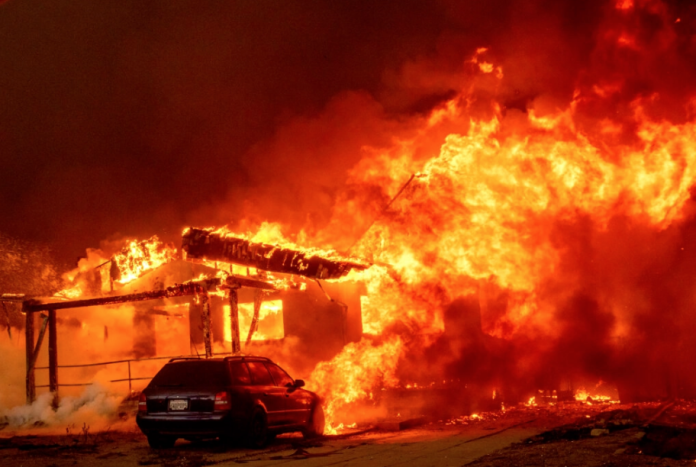As wildfires continue raging out of control, killing 10 in Los Angeles County and damaging thousands of acres and structures there, one in 10 homeowners in the region stand to lose everything due to a lack of homeowner’s insurance, according to a Jan. 9 report.
“The high wildfire risk in California has led to insurance companies withdrawing from underwriting policies in some parts of the state or limiting coverage for perils like wildfires, making it even harder for homeowners to find affordable policies that provide them with the protection they need,” Divya Sangameshwar, LendingTree home insurance expert, told The Epoch Times.
Typically, home insurance policies provide coverage to rebuild homes and detached structures and replace homes’ contents, and additional living expenses while they’re uninhabitable.
Los Angeles County, however, does not represent the highest percentage of uninsured homes. The rate of uninsured homes in the California counties of Humboldt, Lake, and Kings stands at more than 19 percent, followed by five additional counties with more than 15 percent uninsured.
According to the Federal Emergency Management Agency (FEMA) website, crews are already on the ground providing assistance to find places for people to live temporarily.
“Since this has been declared a major disaster, homeowners may also be able to apply for disaster loans from the Small Business Administration (SBA) that offers lower interest rates,” Sangameshwar said. “But because of the escalated value of homes in the region, most rebuilding costs are likely to be upward of $1 million.”
Currently, California is ranked as the top state in the nation that is most at risk from wildfires. The state also ranked third for expected economic loss due to casualties and injuries from wildfires. Historically, the Golden State has seen the most cost damage and the highest number of billion-dollar wildfires, with damage from the current wildfires exceeding $20 billion.
While wildfires are rare in the Northeast, homeowners in flood zones often face similar situations with ever-escalating insurance costs. JoAnne Murray, president of Allan Block Insurance in Tarrytown, New York, told The Epoch Times she recently quoted insurance costs for a $2 million Long Island residence at $48,000 a year—up from just $6,000 last year. A Florida client’s premium was quoted at a staggering $340,000 a year for a $7 million coastal home—up from $26,000 the previous year.
“In the 40 years that I’ve been doing this, I have never seen it this bad,” she said. “In addition to water damage, one of the biggest factors affecting the rising costs is wind damage.”
Murray also noted that insurance firms are also required to purchase insurance from reinsurance companies, if they have a dollar limit as to the amount of claims they can handle. “Because of the number of claims, the cost of the reinsurance has also increased, leaving insurance companies to pass that cost along to consumers.”
The California Department of Insurance, meanwhile, is working closely with federal, state, and local agencies to help survivors of the devastating wildfires with recovery issues related to insurance. They have also set up a consumer hotline at 800-927-4357.
“California’s home insurance market needs urgent reform because homeowners are making this a risky choice due to a lack of affordable options,” Sangameshwar said.
“Some of the largest insurance companies have stopped offering home insurance or are becoming more selective about which homes they’ll insure.”
To that end, California Insurance Commissioner Ricardo Lara, who authored Senate Bill 824 in 2018, reminded consumers that this law now requires a mandatory one-year moratorium on insurance companies canceling or non-renewing residential insurance policies in certain areas within or adjacent to a fire perimeter after a declared state of emergency is issued by the governor.
For those unable to obtain fire insurance, the California FAIR Plan is the state’s insurer of last resort, providing access to fire coverage for homeowners who cannot get insurance from a traditional carrier. FAIR Plan was created in 1968 following the brush fires of the 1960s.
“The good news is that this offers coverage for wildfires, but nothing else,” Sangameshwar said. “Other items like theft, wind, or water damage, etc., would need to be purchased as an add-on.”
Sangameshwar believes that the constant demand for housing may continue to push developers into building in high-risk areas, creating a potential hazard for new homeowners.
“When there are droughts, dry conditions, and high winds, wildfires are always a possibility, and I think homeowners need to be more aware of that and factor those extra insurance costs into the price of the home.”






















